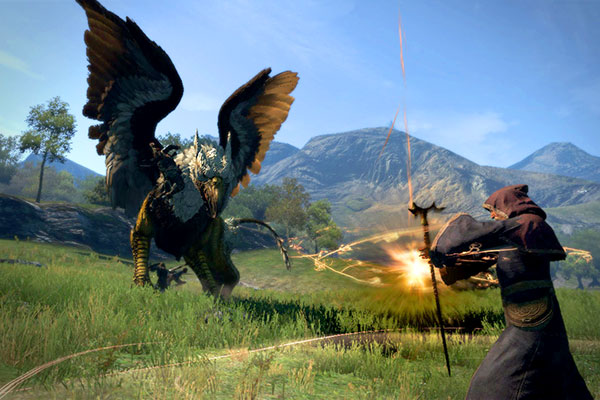Dragons Dogma
Here, for you to peruse at your leisure, is a typical session of Dragon’s Dogma: “Wolves are sensitive to fire. Wolves don’t like being burned. If you attack a wolf with some kind of incendiary spell or burning arrow it will do extra damage. They hunt in large groups and also hate fire. Goblins hate ice and – this is important, mind – also fire. Set the wolf on fire.”
You play as the Arisen, any old citizen of the woodland-, castle wall- and impassable bluff-covered fantasy realm of Gransys. Character customisation is detailed and doesn’t discriminate. I pushed the “age” slider until it strained against the right hand side of the menu, and quested as an octogenarian whose spine was riddled with arthritis after a career of manual corn-ploughing.
Shortly after the game begins, a colossal dragon bears down on a humble fishing village. You decide to attack it, and your still-beating heart is promptly plucked from your chest cavity and devoured by the creature. The sight of the organ on the tip of a single obsidian claw is, unfortunately, the most entertaining part of the entire tale. From that point on the story is inconsequential, and is delivered in a pseudo-old timey dialect. Every NPC seems to wile away their days thinking of excuses to use the
word “aught”.
It’s fair to say that you come to Dragon’s Dogma for the combat, and the combat, thankfully, is arguably more sophisticated than any other RPG. Giants, chimeras, griffins and even dragons can be found in otherwise featureless forest clearings. Stumbling across them (at least once you are at a high enough level to take them on) is a treat. Every huge enemy can be scaled, Legolas-style, and a blade cruelly driven into its weak point. It’s never easy. A chimera’s snake tail will cover its weak spots until you cut it off, and a giant has armour plates strapped
to its ankles.
The roughly person-sized enemies are just as varied. Wolves will grab you and your pawns in their jaws when you’re knocked down. Lizard people are much easier to deal with once you have circled behind them and cut off their tails.
The rag-tag party building system in the game is clever. You pick one main ally, or “pawn”, at the start of the game, and deck her or him out with abilities and equipment as the story progresses. The rest of the party can be rounded out either with strangers you meet in town or (and here’s the cool part) with the pawns of other players who own the game. The pawns themselves are deliberately bland. They are a race of beings that exist only to sycophantically serve the player and stroke the Arisen’s ego. Pawn dialogue is painfully repetitive. Mostly it’s advice: “wolves hate fire”, “there are monsters in the wilderness”, “look, a tree!”.
With such great core mechanics, it’s a shame that Dragon’s Dogma seems to go out of its way to be frustrating. Not only are the quests, the pawns, the quest givers and the environment quite uninteresting, there’s also no fast travel to speak of unless you deign to pay gross amounts in game currency. This makes some sense in a game like Morrowind, where the world is unique, but Gransys is a collection of tediously typical woodlands and dank caves.







